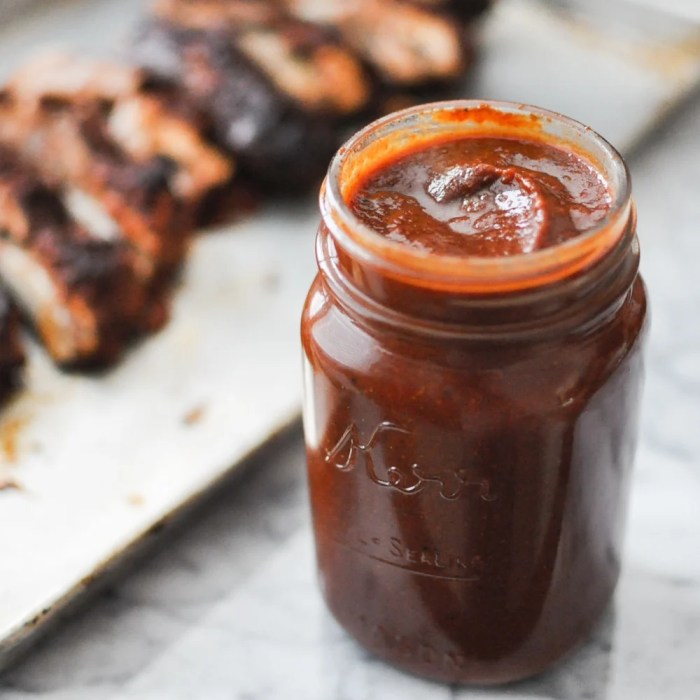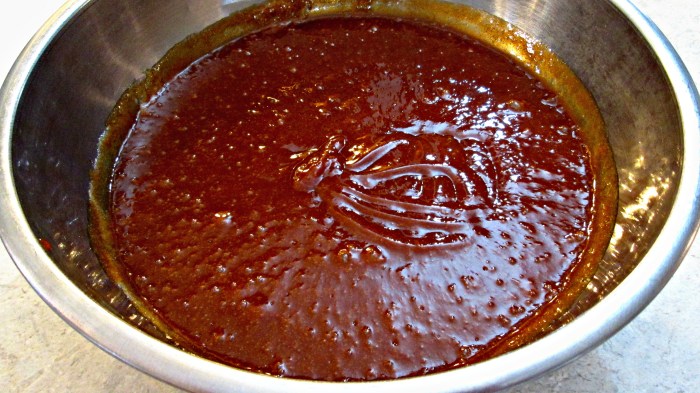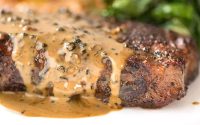Eastern BBQ Sauce Recipe A Flavorful Guide
Understanding Eastern BBQ Sauce
Eastern bbq sauce recipe – Eastern BBQ sauce, a vibrant and complex condiment, stands apart from its Western counterparts through its unique blend of sweet, savory, and tangy flavors. This article delves into the defining characteristics of Eastern BBQ sauce, exploring its key ingredients, recipe variations, and culinary applications.
Defining “Eastern BBQ Sauce”
Eastern BBQ sauce, primarily associated with the cuisines of East Asia and the American South, differs significantly from the tomato-based Western styles. It’s characterized by a prominent use of soy sauce, rice vinegar, or other Asian-style vinegars, lending a savory umami base. Sweetness is often derived from sugar, honey, or brown sugar, balanced by a tang from the vinegar and a subtle spiciness from ingredients like ginger, garlic, or chili flakes.
Western BBQ sauces, in contrast, heavily feature tomatoes, creating a richer, more robust flavor profile that’s often sweeter and less acidic.
Key flavor profiles include sweet and tangy, savory and umami, and spicy and smoky. The balance of these profiles varies greatly depending on the specific recipe.
Common ingredients in Eastern BBQ sauces include soy sauce, rice vinegar, sugar, garlic, ginger, and sesame oil. Western BBQ sauces typically use tomatoes, ketchup, brown sugar, vinegar (often apple cider), and spices like paprika and chili powder.
| Sauce Name | Sweetness Level | Spiciness Level | Tanginess Level |
|---|---|---|---|
| Sweet and Tangy Korean BBQ Sauce | High | Low | Medium |
| Spicy Gochujang BBQ Sauce | Medium | High | Medium |
| Savory Teriyaki BBQ Sauce | Medium | Low | Low |
| Umami-Rich Oyster Sauce BBQ | Low | Low | Low |
Ingredient Exploration

Source: fedandfit.com
Each ingredient plays a crucial role in shaping the final flavor of Eastern BBQ sauce. Vinegar provides acidity and brightness, soy sauce contributes saltiness and umami, sugar adds sweetness, and spices offer depth and complexity.
Alternative ingredients can be used to create variations. For instance, maple syrup can replace brown sugar, mirin can substitute rice wine vinegar, and fish sauce can add a deeper umami note. Different vinegars impart distinct flavors; apple cider vinegar adds a fruity sweetness, while rice wine vinegar offers a subtle, more delicate acidity.
- Hoisin sauce
- Five-spice powder
- Star anise
- Black peppercorns
- Fresh ginger and garlic
Recipe Variations and Techniques
The cooking method significantly impacts the sauce’s texture and flavor. Simmering allows flavors to meld gently, while reducing concentrates the sauce, intensifying its taste and thickening its consistency. The consistency can be adjusted by controlling the simmering time or adding thickening agents like cornstarch or arrowroot powder.
Sweet and Tangy Eastern BBQ Sauce:
cup rice vinegar, ½ cup soy sauce, ½ cup brown sugar, ¼ cup honey, 2 cloves garlic (minced), 1 tbsp ginger (grated), 1 tsp sesame oil. Simmer until thickened.
Spicy and Smoky Eastern BBQ Sauce:
cup apple cider vinegar, ½ cup soy sauce, ¼ cup brown sugar, 2 tbsp gochujang, 1 tbsp gochugaru, 1 tbsp smoked paprika, 1 clove garlic (minced). Simmer until thickened.
Savory and Umami Eastern BBQ Sauce:
cup rice wine vinegar, ½ cup soy sauce, 2 tbsp oyster sauce, 1 tbsp fish sauce, 2 cloves garlic (minced), 1 tbsp ginger (grated), 1 tbsp sesame oil. Simmer until thickened.
Pairing Suggestions and Applications

Source: poormansgourmetkitchen.com
Eastern BBQ sauce pairs beautifully with a wide range of dishes. It can be used as a marinade, glaze, or dipping sauce, enhancing the flavors of meats and vegetables.
| Dish | Meat/Vegetable | Cooking Method | Sauce Application |
|---|---|---|---|
| Grilled Chicken Skewers | Chicken | Grilling | Marinade and glaze |
| Roasted Vegetables | Broccoli, carrots, bell peppers | Roasting | Glaze |
| Pork Belly Buns | Pork belly | Braising/slow cooking | Glaze and dipping sauce |
| Stir-fried Tofu | Tofu | Stir-frying | Sauce |
Imagine succulent glazed pork belly, its rich brown exterior glistening with a sweet and savory Eastern BBQ sauce. The sauce’s glossy texture contrasts beautifully with the tender, slightly crispy pork, creating a visually appealing dish with a harmonious blend of textures and flavors.
Preservation and Storage, Eastern bbq sauce recipe
Proper storage is crucial for maintaining the quality and safety of Eastern BBQ sauce. Store it in airtight containers, preferably glass jars, in the refrigerator for up to two weeks. Avoid using plastic containers, as they can absorb odors and potentially leach chemicals into the sauce. Discard the sauce if you notice any signs of mold, unusual discoloration, or off-odors.
Always label and date your stored sauce for easy tracking.
User Queries: Eastern Bbq Sauce Recipe
Can I use this sauce on fish?
Yes, the versatility of Eastern BBQ sauce makes it suitable for various proteins, including fish. However, lighter fish might benefit from a reduction in the sauce’s spiciness.
How long does homemade Eastern BBQ sauce last in the refrigerator?
Properly stored in an airtight container in the refrigerator, homemade Eastern BBQ sauce should last for approximately 2-3 weeks.
Can I freeze Eastern BBQ sauce?
Yes, freezing is an excellent method for long-term storage. Freeze the sauce in airtight containers, leaving some headspace for expansion. It should retain its quality for 2-3 months.
What are some good substitutes for soy sauce?
Tamari or coconut aminos can be used as substitutes for soy sauce, though they might slightly alter the overall flavor profile.



